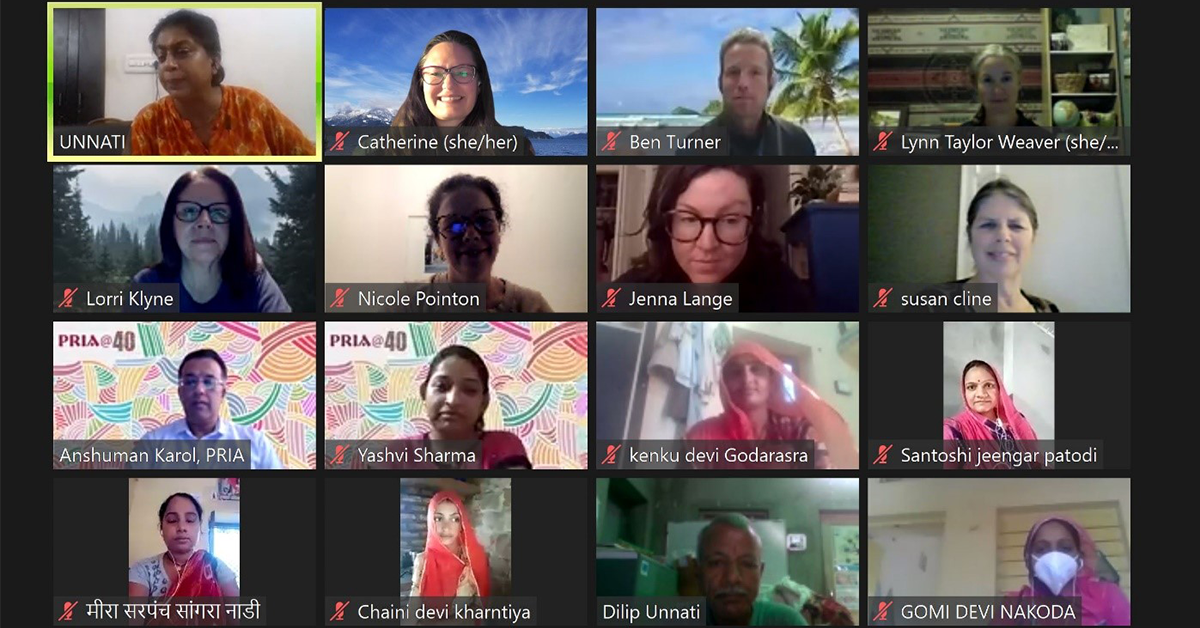Global Leadership Virtual Field Study with India

A collaboration between Participatory Research in Asia (PRIA) and RRU
RRU’s Master’s of Arts in Global Leadership (MAGL) students have had the option to join a field study in Ecuador for several years now through the elective, GBLD 535. When the COVID-19 pandemic thwarted plans to take Canadian students on a similar field experience to India, Participatory Research in Asia (PRIA) and RRU designed a seven-week virtual field school. The purpose was to demonstrate leadership development from below, learning about how PRIA and its partners support leadership to evolve from the most marginalised communities in India. PRIA and partners seek to facilitate community mobilisation, interfacing with governance institutions to support rights advocacy.
From August 31 to October 17, 2021, students participated in weekly site visits to community groups in India working on global leadership topics such as:
- Strengthening women’s leadership in local governance, using the progressive provision in Indian constitution for reserved seats for women in local governments;
- Building leadership of Women Domestic Workers for demanding dignity of their labour;
- Building leadership in urban Informal communities by organising them into settlement improvement committees for accessing basic public services like water and sanitation; and
- Encouraging youth leadership to promote safety of girls and women in public spaces and using sport for development (S4D) to support gender equality.
Special thanks to the PRIA instructors and community partners who translated and facilitated conversations with community groups:
- Dr. Rajesh Tandon
- Dr. Kaustuv Kanti Bandyopadhyay
- Dr. Anshuman Karol
- Nandita Pradhan Bhatt
- Sumitra Srinivasan
- Nitya Sriram Srinivasan
- Samiksha Jha
- Suheil F. Tandon
- Kabeer Arjun
- Swapni Shah (from UNNATI)
- Yashvi Sharma
- And several others not named here
On September 7th we completed our first virtual “site visit” as part of this field study. Canadians met with six women elected representatives at the Panchayati Raj level (municipal/local self-governance) in India. These leaders were all the first women in their families to serve in government and are leading in the context of drought, poverty, sexual harassment and discrimination, not to mention COVID-19. These women are working with a non-profit capacity-building organization called UNNATI to enhance their knowledge, leadership, and advocacy skills. Topics of conversation included: the steep learning process when entering an elected governance position; different experiences of support or manipulation from male family members; learning how to use their voices to advocate for their communities; overcoming fear and discrimination; how the 73rd and 74th constitutional amendments in India have increased the role of women and scheduled caste participation in governance; training strategies for women leaders; what Canadians can learn from India as well as the similarities and differences between the two countries. It was a rich conversation and powerful learning opportunity in a virtual setting.
We would like to acknowledge and express our gratitude to Amit Bhatt, Kaustuv Bandyopadhyay, Sumitra Srinivasan, and RRU Adjunct Professor, Rajesh Tandon on the PRIA side for their work developing the course, as well as Lisa Corak, Wanda Krause, Catherine Etmanski, and Sherry Richards on the RRU side. And our special thanks goes to Wendy Rowe and Lisa Corak for their work designing the original GBLD 535 field studies in Ecuador.
For more information on UNNATI, please see:
UNNATI Organisation for Development Education. (2009). Making space: Women's participation in local politics in Rajasthan. Gujarat, India.
Blog post photo included with the permission of the participants.